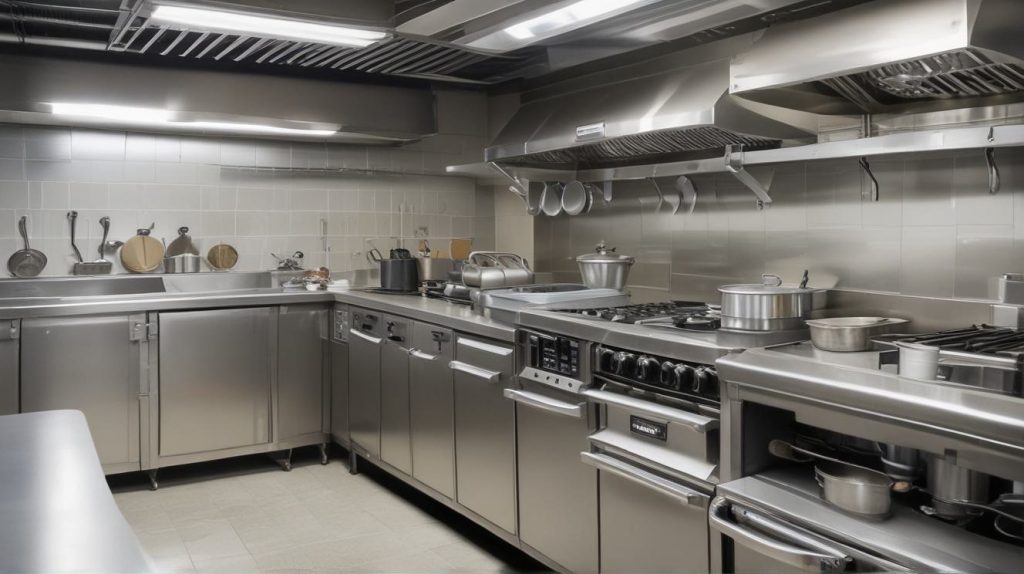Top Tips for Repairing Commercial Kitchen Equipment
ArticleCommercial kitchens rely on a range of specialized equipment to prepare and serve food efficiently. Keeping this equipment in top working condition is essential to maintaining a smooth operation, minimizing downtime, and controlling costs. From ovens and refrigerators to deep fryers and dishwashers, understanding common issues and maintenance practices can help prevent breakdowns and extend the lifespan of your kitchen tools. Here are essential tips for repairing and maintaining commercial kitchen equipment.
Common Kitchen Equipment Problems
Common issues in commercial kitchens include malfunctioning ovens, refrigerators that don’t maintain temperature, clogged deep fryers, and dishwashers that fail to clean properly. These problems can disrupt kitchen operations, leading to slower service and potentially lost revenue. Identifying and addressing issues early is key to minimizing downtime and ensuring food safety. For most appliances, issues can stem from clogged filters, worn-out gaskets, faulty thermostats, or electrical problems.
Fixing Restaurant Equipment
When restaurant equipment breaks down, prompt action is essential to avoid disrupting service. Start by checking for simple fixes, such as power connections and circuit breakers, as sometimes the issue is as basic as a loose plug or tripped breaker. Consult the equipment manual for troubleshooting tips, and keep essential tools on hand, like wrenches and screwdrivers. Some minor repairs, like replacing door gaskets or tightening bolts, can often be handled in-house, saving time and money.
Commercial Oven Troubleshooting
Commercial ovens are one of the most used appliances in a kitchen, and they can experience issues like uneven heating, temperature control problems, or burner failure. Start troubleshooting by checking the thermostat for accuracy and ensuring the heating elements are in good condition. If the oven isn’t reaching the desired temperature, calibrate the thermostat or replace it if necessary. Clean the oven interior and remove debris to maintain consistent heat distribution. Regular oven maintenance helps prevent performance issues.
Repairing Commercial Refrigerators
Commercial refrigerators are essential for keeping ingredients fresh, but they can encounter problems such as fluctuating temperatures, ice buildup, or leaking. For temperature issues, check the thermostat and clean the condenser coils, as dirt and dust can impede cooling. Leaks are often caused by blocked drain lines, which can be cleared with warm water. If the refrigerator isn’t cooling properly, it may require a professional inspection to check for refrigerant leaks or compressor issues.
Maintenance Tips for Kitchen Equipment
Routine maintenance is the best way to keep kitchen equipment running smoothly. Regularly clean appliances to prevent grease buildup, which can hinder performance. Schedule periodic deep cleanings and inspections to catch minor issues before they become major problems. For equipment with filters, such as refrigerators or deep fryers, change filters as recommended by the manufacturer to maintain efficiency. Following a maintenance schedule reduces the risk of unexpected breakdowns and extends equipment life.
Keeping Commercial Equipment Running
To keep commercial kitchen equipment running optimally, establish a daily and weekly maintenance routine. For example, clean grills, fryers, and ovens daily to prevent residue buildup. Regularly inspect appliances for wear, such as frayed cords or loose connections, and address issues immediately. Ensure kitchen staff is trained on proper equipment usage and cleaning protocols to prevent misuse, which can lead to premature wear and tear.
Costs of Repairing Kitchen Equipment
Repair costs for commercial kitchen equipment can vary depending on the extent of the damage and the type of appliance. Minor repairs, such as replacing a gasket or tightening bolts, are often inexpensive and can be done in-house. However, more complex repairs, like fixing compressors or electrical components, may require professional service, which can be costly. Investing in regular maintenance can prevent frequent repairs, reducing long-term costs and helping avoid major breakdowns.

Troubleshooting Commercial Dishwashers
Commercial dishwashers play a critical role in restaurant operations, but they can experience issues such as poor cleaning performance, leaks, or drainage problems. If dishes aren’t coming out clean, check for clogs in the spray arms or filters, and clean them if necessary. Leaks are often caused by worn-out door gaskets, which can be replaced. If the dishwasher isn’t draining, check for blockages in the drain line. Regular cleaning and descaling are essential for optimal dishwasher performance.
Cleaning and Repairing Deep Fryers
Deep fryers are prone to grease buildup, which can cause clogs and affect cooking efficiency. Clean deep fryers daily by draining the oil, wiping down the interior, and removing food particles. Filters should be cleaned regularly, and oil should be replaced when it becomes cloudy or has a strong odor. For repairs, common issues include faulty thermostats and heating elements. Replace damaged components promptly, as neglected deep fryers can pose fire hazards and reduce food quality.
Restaurant Equipment Repair Services
While some repairs can be handled in-house, professional repair services are essential for complex issues or appliances with high safety risks. Certified repair technicians have the expertise to handle electrical repairs, refrigerant systems, and mechanical failures safely. Many repair services offer maintenance contracts, which include regular inspections and priority repairs, making it easier to keep equipment in good working order. For high-value equipment, investing in a repair service can reduce long-term costs by ensuring timely repairs and preventive maintenance.
In conclusion, understanding how to maintain and repair commercial kitchen equipment is crucial for efficient operations in any restaurant. Regular cleaning, timely troubleshooting, and adherence to maintenance schedules can help prevent breakdowns, extend the lifespan of equipment, and reduce costly repairs. Whether it’s a commercial oven, refrigerator, or deep fryer, a proactive approach to maintenance ensures that kitchen equipment remains reliable and supports smooth service for customers.
